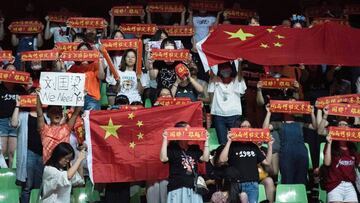Ping pong boycott in China
The removal of Liu Guoliang, China’s top table tennis coach, has awakened tensions in the East Asian country’s sporting world.</br><a title="Nadal vs Thiem live online: 2018 French Open final" href="https://en.as.com/en/2018/06/10/other_sports/1528633526_195806.html">Nadal vs Thiem live online: 2018 French Open final</a>

Table tennis athletes have protested against management issues after the highly respected former Grand Slam champion Liu Guoliang lost his job as chief of the Chinese national team.
On Friday, China’s three top players - Ma Long, Fan Zhendong and Xu Xin - made no appearance at their second-round singles matches at the ITTF China Open in Chengdu, one of the most prestigious ping pong tournaments.
Two Chinese coaches - Qin Zhijian and Ma Lin - also failed to show up.
Players and coaches posted an identical protest message online.
“We don't feel like playing any more right now, because we miss you Liu Guoliang.”
In an unprecedented outcry of anger, fans of table tennis all over China assembled online to show their annoyance against the Chinese Table Tennis Association (CTTA).
"Looking at it from a larger picture, the athletes' no-show at the matches is out of discontent with bureaucracy. I always vote for fighters to stand up to the system," wrote Gong Liegang on Weibo, China’s biggest micro-blogging site.
"Japan and Germany must be really happy, now that the sports administration has shot itself in the foot," said another Weibo user.
Liu Guoliang’s removal
Once a gifted table tennis player, Liu won virtually every domestic and international competition in the ping pong world, leading him to be appointed as the head coach of China 14 years ago.
On 20 June, just a week ago, he was removed from his position and made vice-president of the CTTA.
However, the position is considered merely ceremonial, as there are other 18 vice-presidents.
Liu’s removal came as part of a management restructuring process made by China’s General Administration of Sport (GAS). This process aims to improve efficiency of national athletes ahead of the upcoming Tokyo 2020 Olympic Games.
For table tennis, there will now be individual coaches for men’s and women’s teams, while the head coach position will be obliterated.
Liu was responsible for leading the Chinese men’s team to a perfect record at last year’s Olympic Games in Rio.
He is also celebrated for his tireless support of grass-roots ping pong among the Chinese youth.
Due to Liu’s outstanding performance, there seems to be no reason for his removal.
There is a lack of transparency about his removal, with the CTTA failing to make official comments regarding the matter.
Liu Guoliang takes responsibility
On Tuesday, the former national team coach commented on his Weibo account that he was not aware of any possible boycott, but still felt responsible for the events.
"These athletes and coaches are all team members that I had coached before... I hereby bow and apologise to all table tennis fans on their behalf," posted Liu.
In the same post, he stated his support for the Chinese sporting reform.
"I think the Chinese sports reform must be enforced," said Liu. "There are indeed many problems in the current management system. On the path of reform, I will not stand in the way of the ongoing reform, just because I have been removed from my former position.
"Don't blame anyone. Don't lose confidence. Don't run away from your responsibilities. We should be united to overcome difficulties," he added.
'Ping pong diplomacy'
Table tennis is one of China’s most popular sports, causing it to be heavily politicised.
In the early 1970s, 15 players from the United States were allowed to enter the Chinese mainland. The following year, China sent their team to the US.
These events, known as the ‘ping pong diplomacy’, marked a thawing in Sino-American relations.
During the following years, due to its political and historical connotations, table tennis became popularly known as the Chinese national sport.
Because of its importance, players are asked to achieve glory for their team and country by all means. Extreme measures are often justified, with Beijing playing a controlling role over the sport.
Authorities have been heavily criticised for interfering too much in the athletes' affairs. The public’s active response to Liu’s removal displays their dissatisfaction with China’s sport system.
Mentions of Liu and the players' boycott, were the most censored online on Monday, according to Free Weibo, a censorship-tracking site.
Related stories
The posts of the three players and the two coaches were deleted a couple of hours after their publication, with the five posting identical apologies on Sunday.
The Chinese Table Tennis Association has no definite plan yet on how the boycotting athletes are to be punished.